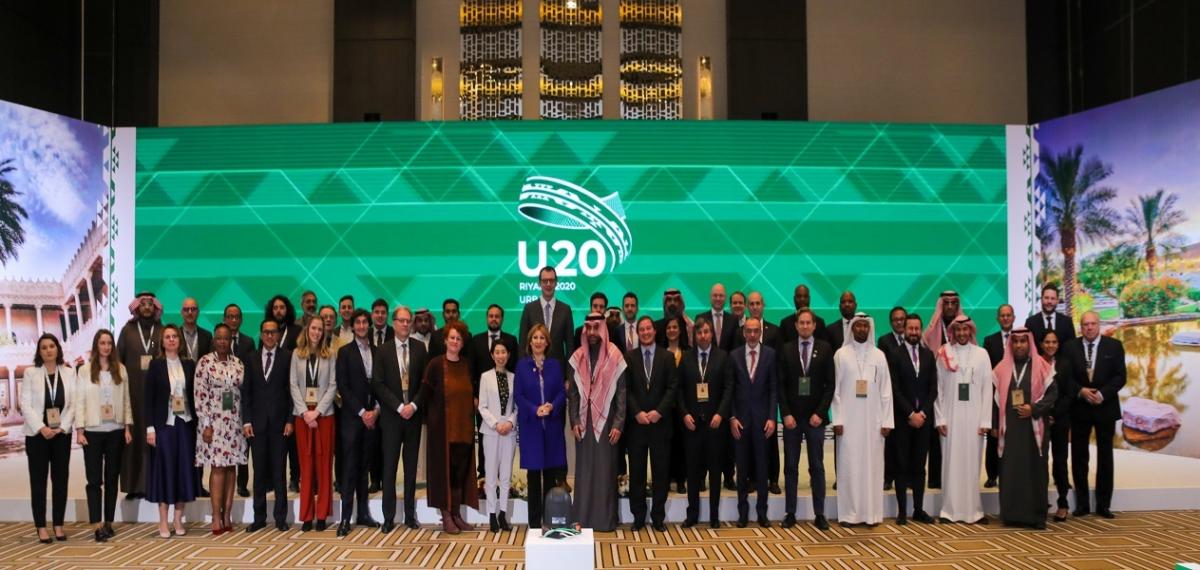
U20 in 2020
The Urban 20 (U20) provides a mechanism for cities to engage in the G20. The third Urban 20 Summit was virtually hosted by Riyadh in October 2020, under the leadership of the 2020 U20 Chair His Excellency Fahd Al-Rasheed. Its main output was the 2020 U20 Communiqué, which was shared with the G20 2020 Sherpa of Saudi Arabia, ahead of the G20 Summit virtually held by Riyadh, November 2020. The Communiqué was endorsed by the leaders of 39 cities, together representing 155 million people.
The U20 Communique was signed specifically by the mayors, or governors of: Abu Dhabi, Amman, Amsterdam, Barcelona, Berlin, Buenos Aires, Columbia, Dammam, Dubai, Durban, Hartford, Helsinki, Houston, Istanbul, Izmir, Jakarta, Johannesburg, Lisbon, London, Los Angeles, Madrid, Makkah, Mexico City, Miami, Milan, Montreal, Osaka, Paris, Rio de Janeiro, Riyadh, Rome, Rotterdam, San Jose, Sao Paulo, Seoul, Strasbourg, Tegucigalpa, Tokyo and Tshwane.
The Communiqué calls on Heads of State and Government of the G20 to work together in four main areas:
Partner by Investing in a Green and Just Post COVID-19 Recovery
Investments should be made in cities’ social infrastructure, in particular health, education and public transport systems alongside sustainability priorities, specifically by investing in ‘shovel-ready’ carbon-neutral projects to generate green jobs and increase equitable participation in the labour force.
U20 cities further ask national leaders to cooperate with us towards guaranteeing access to vaccines for the COVID-19 virus without discrimination of any kind and that technology and innovation equitably serve people during and following the COVID-19 recovery.
Safeguard our Planet through National & Local Collaboration
U20 cities call on the G20 leaders to work together with cities to respond immediately to the climate emergency by substantially reducing GHG emissions with the aim to collectively deliver the 50% global reduction required by 2030 and reaching carbon neutrality no later than 2050 – in line with the objectives of the Paris Agreement and taking into account the Intergovernmental Panel on Climate Change’s Special Report on 1.5 Degree of Global Warming.
U20 cities also call on the G20 leaders to mainstream and strengthen the role and active participation of cities in the local implementation of international biodiversity, climate and sustainability goals – such as by investing in nature-based solutions and including cities in the post 2020 Global Biodiversity Framework (GBF).
Accelerate the Transition to a Circular, Carbon-neutral Economy
U20 cities further call on G20 leaders to increase investment in renewables and adopt a universal right of access to urban sanitation and waste management and promote ‘zero waste societies’.
Empower People to Deliver a More Equitable & Inclusive Future
U20 cities call on G20 leaders to address equitable urban social safety nets and protection, growth of systems to ensure affordable and accessible housing, equal and quality education and employment opportunities for all, protection of all women from inequality and violence, and elimination of socioeconomic disparities between different ethnic groups.
